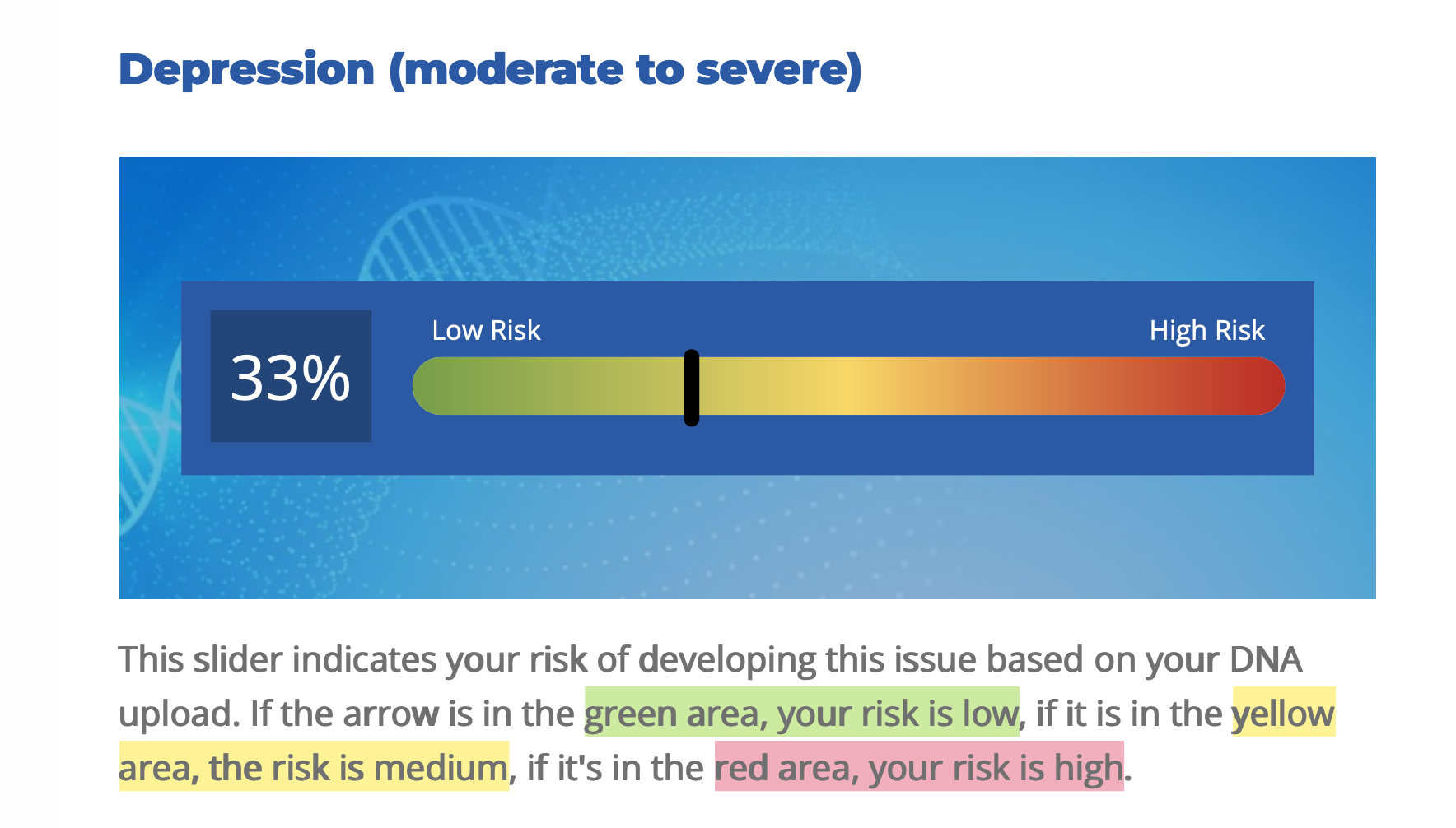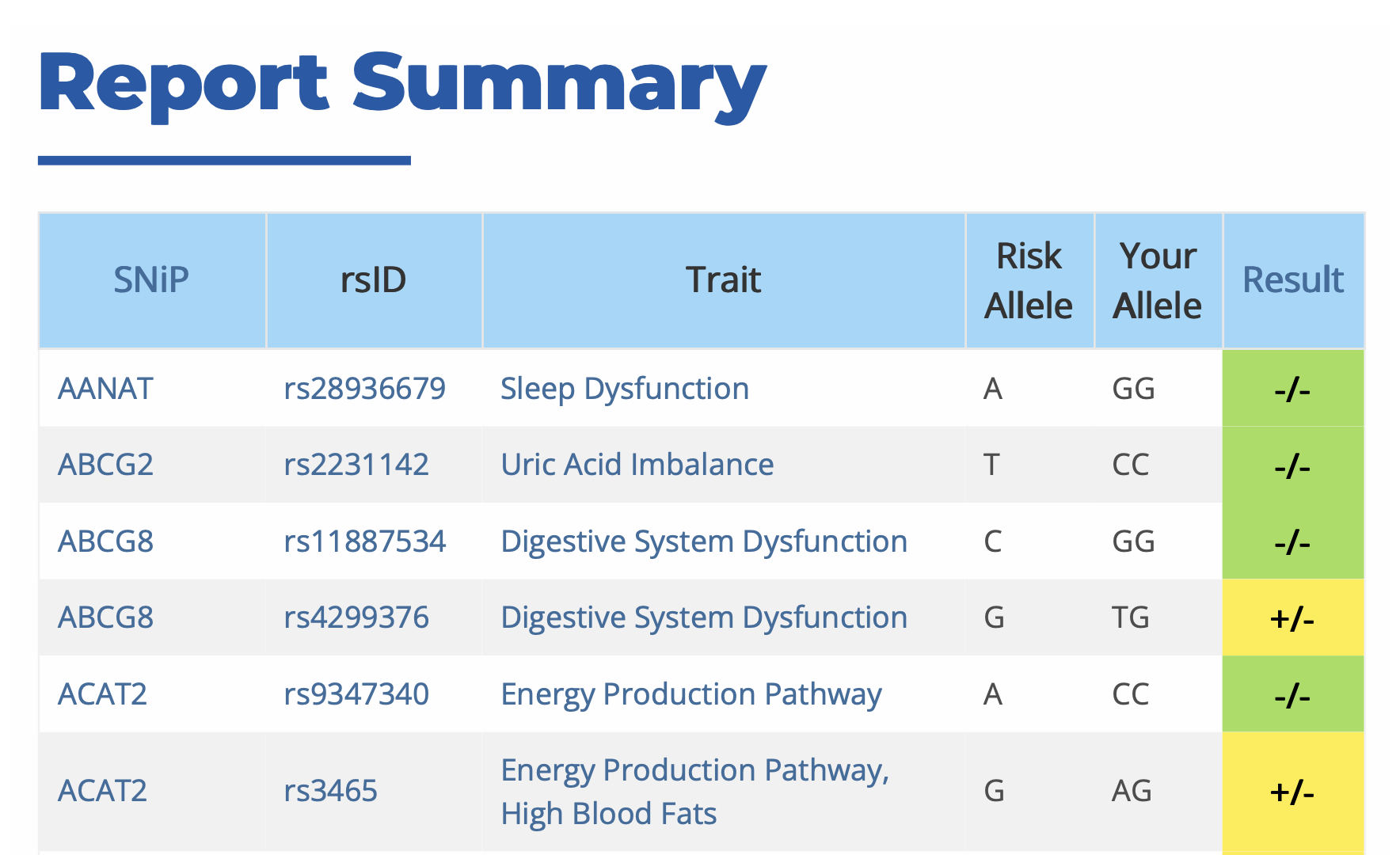
Overview
- Products: DNA kit with a Mood and Personality report, plus optional Diet and Lifestyle and three practitioner-only reports.
- Cost: The DNA kit costs $325, with add-on reports from $49 and private consultations at $400 per hour.
- Reports: Reports display results for 21 mood and personality traits and, in practitioner versions, include biochemical and disease-related insights.
- Raw data access: Yes.
- Alternatives: Competitors like SelfDecode offer more advanced genetic analysis, published validation, multi-omics integration, and broader health coverage.
MyHappyGenes Pros and Cons
Pros
- Clickable links to scientific studies for users who want to explore research on specific genes
- Practitioner support available for those seeking guided interpretation
Cons
- Very limited genetic analysis compared to competitors that analyze millions of variants
- No polygenic risk scoring that is validated across a large population of people with depression, making it unable to prove accurate predictions for complex traits.
- Does not integrate lab results or lifestyle data for a complete picture
- No published validation studies on their model or transparency about the scientific methods used.
- One full time clinician, with no disclosed in-house bioinformaticians. See their team
About MyHappyGenes
MyHappyGenes is a genetic testing company founded in 2019 by Dr. J Dunn, a chiropractor with a background in natural sciences and functional medicine. Headquartered in Islamorada, Florida, the company focuses on analyzing genetic variants related to brain chemistry, mood, and emotional health. MyHappyGenes offers direct-to-consumer DNA tests that generate reports aimed at supporting emotional and physical well-being through nutritional and lifestyle strategies.
Review of MyHappyGenes Products & Services
MyHappyGenes provides genetic testing primarily focused on emotional health, mood, and nutrition. Their flagship product is a DNA kit paired with a Mood and Personality report that analyzes around 600 gene variants linked to brain chemistry and emotional and physical well-being.
The test uses a cheek swab for DNA collection, and the results are delivered as reports featuring sliders to indicate where users fall across around 100 mood, personality and health traits.
The initial offering is supplemented by a Diet and Lifestyle report, which claims to provide personalized nutritional and lifestyle recommendations based on your genetic profile. However, this additional report is sold separately after purchasing the DNA kit, which may increase the overall cost for consumers seeking comprehensive insights.
For users wanting more in-depth analysis, MyHappyGenes offers three practitioner-only reports covering biochemical pathways, genetic disease risk, and supplement recommendations based on symptom questionnaires. Access to these requires working with a licensed healthcare practitioner, potentially limiting direct user access to full data and personalized interpretation.
The company also offers one-on-one consultations with Dr. J Dunn, the company’s founder, who has over 30 years of experience in natural and functional medicine. This session aims to clarify genetic report findings and provide personalized guidance, although it comes at an additional cost.
While MyHappyGenes emphasizes personalized emotional health insights through genetic testing combined with practitioner support, the reliance on practitioner-mediated reports and the tiered pricing model may make it less accessible for users seeking fully independent, self-guided genetic health analysis.
Review of MyHappyGenes Mood Report
The MyHappyGenes Mood Report, as shown in the sample PDF, analyzes around 600 SNPs linked to mood, personality traits, and certain behavioral tendencies.
The results are presented in the form of sliders that indicate low, medium, or high genetic risk for traits such as depression, anxiety, addictive behaviors, mood swings, irritability, and focus issues. Each section lists the associated genes and provides a brief explanation of the trait.
While the report uses straightforward visuals and plain-language descriptions, it remains limited in scope. With only a few hundred SNPs analyzed, the coverage is far narrower than more advanced reports.
For example, SelfDecode’s Low Mood Report looks at over 84,000 SNPs and delivers targeted, personalized recommendations based on the full breadth of the data. MyHappyGenes, on the other hand, does not perform validated polygenic risk scoring based on a large population of people with depression, so it cannot prove a precise, statistically robust estimate of an individual’s genetic predisposition to complex mental health traits.
The report includes clickable links to studies on single-gene associations. However, single-gene associations typically play only a small role in determining overall risk for complex traits like depression or anxiety. Without incorporating validated polygenic risk scoring (PRS), which aggregates the effect of thousands of variants and proving the algorithm to be accurate in a large database of people, the results cannot be proven to be predictive.
The PDF also makes frequent reference to “advanced” reports and the involvement of a MyHappyGenes practitioner for actionable advice. This means that the standard Mood Report functions more as an introductory overview than a comprehensive, self-contained analysis.
It does not integrate genetic findings with lab results, lifestyle data, or other health information, which limits its ability to offer a holistic view. The absence of immediate, personalized recommendations in the base report means that users receive descriptive information about their genetics but must take additional steps, often at extra cost, to translate that into practical action.
In short, the MyHappyGenes Mood Report offers a basic, easy-to-read summary of certain mood-related genetic variants, but the lack of depth, integration, and personalized guidance leaves it well behind more comprehensive options on the market.
Health Recommendations from MyHappyGenes
The base MyHappyGenes Mood Report does not provide direct, personalized health recommendations. While the PDF frequently suggests that mood imbalances could be addressed through diet, lifestyle changes, or supplements, these suggestions remain general and are not tailored to the individual’s genetic profile in the standard report. Any actionable advice is locked behind the “advanced” reports, which are only available through a MyHappyGenes-approved practitioner.
MyHappyGenes Team
MyHappyGenes is led by founder Dr. J Dunn, a chiropractor with a background in natural sciences and functional medicine. She brings decades of clinical experience, particularly in functional and integrative health approaches.
However, there is no indication that the company has an in-house bioinformatics, or statistical genetics team responsible for developing and validating the genetic algorithms used in its reports. See their team.
The lack of transparency about their polygenic risk scoring process raises questions about the robustness and reliability of the analysis.
With a small, clinician-led team and no disclosed experts in bioinformatics research or data science, MyHappyGenes appears to operate more as a niche wellness company than as a genomics research organization.
Cost of MyHappyGenes
The MyHappyGenes DNA kit, which includes the foundational Mood and Personality report, is priced at $325. This initial purchase gives users access to their basic genetic insights related to emotional health and personality traits.
Additional reports, such as the Diet and Lifestyle report, are sold separately for $49 and can be purchased after receiving the initial results.
More advanced reports, including the Biochemical Pathways Analysis, My Healthy Genes report, and Personalized Supplement Recommendations, are only available through a licensed healthcare practitioner, which may involve additional fees beyond the standard pricing.
For users seeking personalized interpretation and guidance directly from the founder, Dr. J Dunn, private one-on-one consultations are available at $400 per 60-minute session.
MyHappyGenes Privacy & Security
MyHappyGenes states that it keeps customer DNA data private and secure, but the company provides limited detail on how this is achieved. The website does not outline specific encryption standards, storage methods, or whether genetic data is anonymized before analysis.
MyHappyGenes Reviews
Public customer feedback on MyHappyGenes is limited, and there is no large body of independent reviews or third-party evaluations to draw from.
There is no widespread discussion of the service in major review platforms or peer-reviewed publications, which makes it challenging to gauge overall customer satisfaction, accuracy, and value compared to more established genetic testing companies.
In the absence of broad, independent reviews or published validation studies, potential customers must rely largely on the company’s own marketing materials and the limited first-hand experiences available online.
Single SNP vs PRS vs Advanced PRS
MyHappyGenes relies primarily on SNP analysis, examining roughly 600 individual variants linked to mood and personality traits. While this method is simple and easy to interpret, it captures only a small fraction of the genetic influence on complex traits like depression, anxiety, or emotional resilience.
This approach provides minimal predictive power and cannot account for the cumulative effects of multiple genes.
In contrast, standard Polygenic Risk Scores (PRS) combine thousands to millions of genetic variants into a single score, offering a more accurate assessment of risk. Advanced PRS models take this further by integrating additional data, such as ancestry, age, sex, lifestyle, and clinical markers, using AI-driven algorithms to generate highly reliable and actionable predictions.
Because MyHappyGenes does not use PRS or advanced PRS, their reports are limited to descriptive insights rather than predictive, evidence-based guidance. Users receive a basic overview of certain gene-trait associations, but without the depth and statistical robustness provided by modern PRS methods, the results cannot reliably inform personalized health decisions. Read more about it here.
Alternatives to MyHappyGenes
For those seeking a more advanced, predictive, and scientifically validated approach to genetic health analysis, SelfDecode stands out as a stronger alternative to MyHappyGenes. While MyHappyGenes provides a basic overview of a limited number of genetic variants, SelfDecode delivers industry-leading predictions and actionable insights backed by cutting-edge science.
SelfDecode uses Ancestry-adjusted polygenic risk scoring (PRS), which is the gold standard for predicting genetic predisposition to complex traits, published in a Nature journal and other peer-reviewed journals.
This method evaluates millions of variants at once, rather than relying on single-gene associations, to deliver the most accurate predictions in the industry. Reports are generated from the analysis of over 200 million variants, with millions analyzed per report using advanced AI algorithms.
In addition to predictive power, SelfDecode integrates symptoms, health conditions, lab results, and lifestyle data into its recommendations, offering a true multi-omics approach. Reports are highly comprehensive, with 1,500+ health reports covering everything from mood and cognition to cardiovascular health and immune function.
All of this is supported by published validation, with six peer-reviewed studies in top-tier journals demonstrating the accuracy and reliability of SelfDecode’s methods. Privacy and security are also a top priority, with strict HIPAA and GDPR compliance, robust encryption, and full control over your data.
MyHappyGenes vs. SelfDecode
| Feature | MyHappyGenes | SelfDecode |
|---|---|---|
| Genetic Analysis Method | ~600 SNPs | 200M+ variants analyzed, ancestry-adjusted PRS |
| Predictive Power | No polygenic risk scoring | Most accurate in the industry, validated in a Nature journal |
| Scientific Validation | No published validation | 6 published studies in top-tier journals |
| Data Integration | Genetics only | Multi-omics: genetics + labs + lifestyle |
| Number of Reports | Limited (focus on mood & personality) | 1,500+ reports across multiple health areas |
| Privacy & Security | Limited transparency | HIPAA & GDPR compliant, robust privacy controls |
| Report Depth | Single-gene explanations | Millions of variants analyzed per report with AI |
| Team | Small, clinician-led | Multidisciplinary team of geneticists, bioinformaticians, and clinicians |
If you want to see the difference in depth and quality for yourself, check out a SelfDecode sample report and compare it to the MyHappyGenes sample report. The contrast in scientific rigor, comprehensiveness, and actionable insights is clear.
MyHappyGenes Review Summary
MyHappyGenes offers a simple, visually accessible genetic report focused on mood and personality traits, but its scientific and analytical limitations are hard to overlook.
The analysis is based on roughly 600 SNPs and relies on single-gene associations, which cannot accurately predict risk for complex traits like depression or anxiety. Without polygenic risk scoring, integration of lab or lifestyle data, or a published, validated methodology, the results remain more descriptive than predictive.
The company is small, led solely by a clinician without an in-house team of geneticists or bioinformaticians, and it has not released peer-reviewed studies to support the accuracy of its algorithms.
For users seeking the most accurate, comprehensive, and science-backed genetic insights, MyHappyGenes falls short compared to competitors like SelfDecode. With its published validation, ancestry-adjusted polygenic risk scoring, multi-omics integration, and extensive report library, SelfDecode provides a far deeper and more reliable view of your health potential. If your goal is to gain meaningful, actionable insights from your DNA, SelfDecode is the stronger choice.



